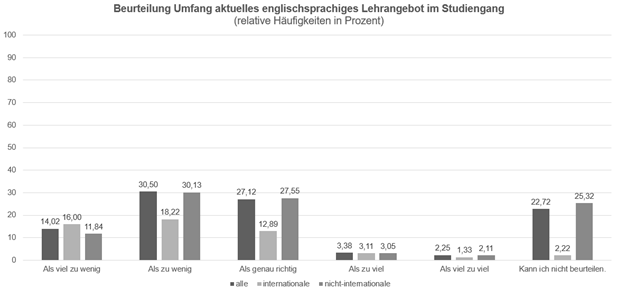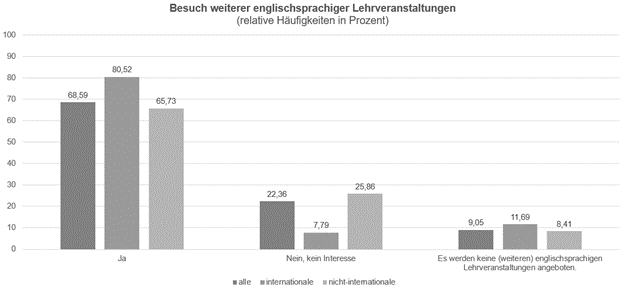How students feel about international teaching Results of an online survey provide insights into acceptance
Technical University of Braunschweig is making its teaching more international and expanding its range of English-language courses. As little is known about student opinion on this matter, a survey was conducted as part of the “ProDiGI – Promoting Digital Education through Global Interconnection” project to determine students’ views on international teaching.
The “ProDiGI” project supports the expansion of international and English-language courses and modules at TU Braunschweig using digital resources. The Foundation for Innovation in Higher Education is funding it with around 3.3 million euros until the end of the year. A key part is the evaluation process, which includes a survey on international teaching practices among TU Braunschweig students between November 2024 and January 2025.
Aim of the survey
Both closed and open questions were used to assess acceptance of, and attitudes towards, international teaching, as well as to identify wishes and concerns. The survey aimed to find out how students feel about international teaching and internationalisation, and what opportunities and risks they associate with it. The survey thus provides important information for aligning international teaching at TU Braunschweig more closely with students’ expectations, making it more attractive and expanding it. A total of 1,635 students took part in the survey, representing just over ten per cent of the student body – 16.7 per cent of respondents were international students.
Too few English-language courses
When asked to define international teaching, most students associated it with “teaching in English”. International students consider this to be more important for their future professional success than non-international students do. Both groups consider the current range of English-language courses in their degree programmes to be too limited, a view shared across all faculties except Faculty 4, whose students consider the range to be “just right”.

Assessment of the scope of the current English-language courses offered in the degree programme. Photo credit: Caroline Kurtz
Regarding the learning effort required for English-language courses, the results show that non-international students perceive it to be higher than for German-language courses, while international students perceive it to be lower.
A significant difference was found in the number of English-language courses attended to date, with international students having attended an average of 2.25 courses and non-international students an average of 1.23 courses.
Students who had not yet attended any English-language courses were given the opportunity to state their reasons in an open response field.
The most common reason given by both groups of students for not participating was that there were no English-language courses available that they could attend: “The topics that interest me are taught in German.”
Motivation to participate: Better conditions
International students are mainly motivated to participate in order to prepare for the international job market and to interact with fellow students. In contrast, non-international students cite good English skills, the acquisition of specialist vocabulary, and the lack of German-language alternatives as reasons for their participation. Another reason given by international students is the low threshold of English-language teaching: “Just to understand the course better”. When asked whether they would participate in English-language courses again, the survey results show that a clear majority of students would choose English-language courses again based on their previous experiences.
Between effort and reward
However, the survey also shows that some students would not attend English-language courses again. The main reasons cited by international students were reduced teaching quality and insufficient availability, while non-international students cited lower learning success rates and increased time and effort.
Desired: Active teaching methods
With regard to the support measures surveyed, students expressed a preference for active teaching methods and exchanges with fellow students. Targeted help with oral and written language production, as well as bilingual teaching materials with accompanying grammar and vocabulary lists, were also desired.
Conclusion
The survey results indicate that many students view English-language or international teaching as a stepping stone to an international career. Those who have had positive experiences are willing to take further courses. They welcome an expansion of the range of courses on offer, accompanied by support formats.
In addition to the student survey, an online survey of TU Braunschweig teaching staff on international teaching was also conducted from May to July 2025. The results will be available at the end of the year.
Text: Marie Vahldiek, Prof. Dr. Stefanie Hartz, Caroline Kurtz

